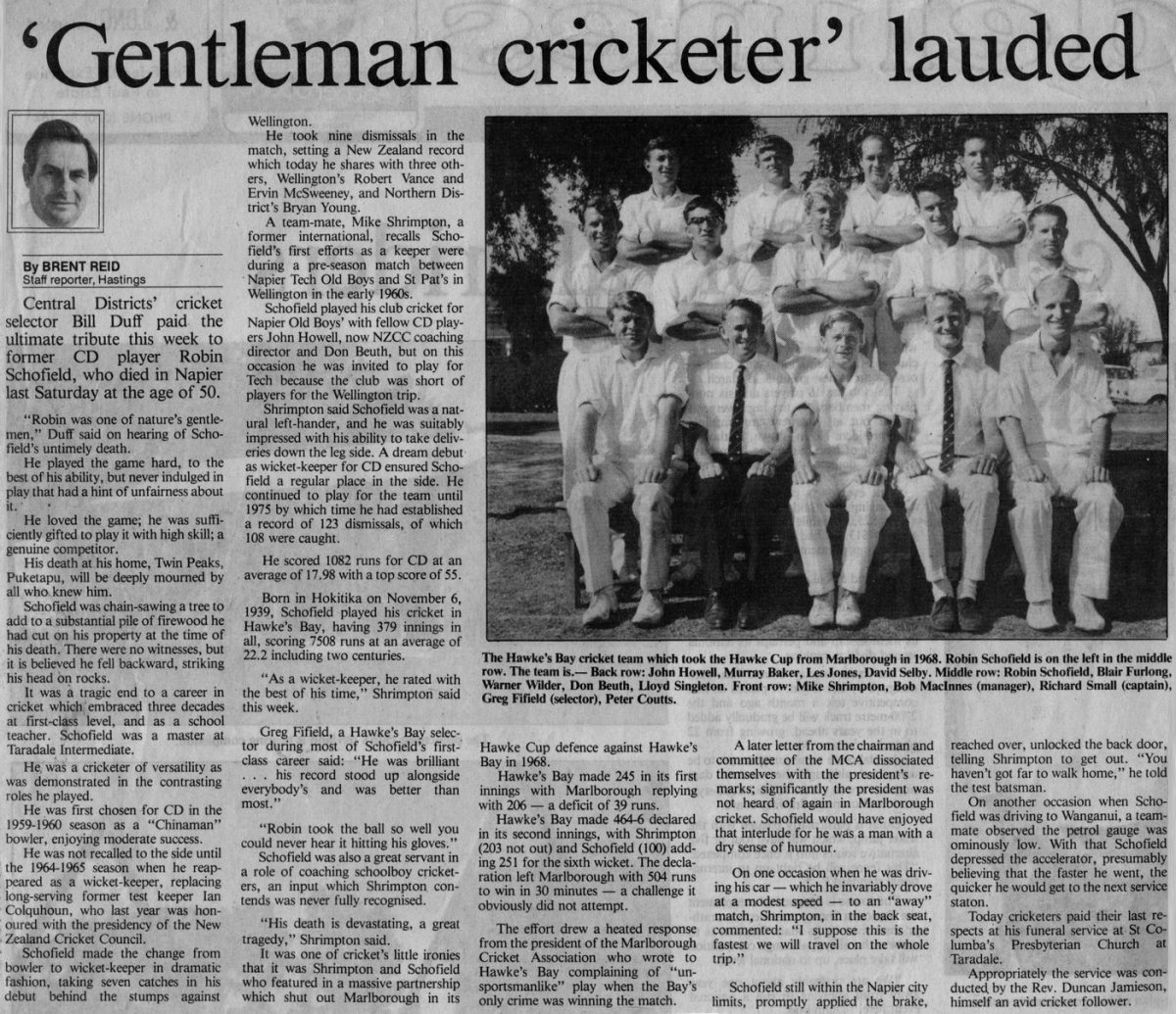‘Gentleman cricketer’ lauded
By BRENT REID
Staff reporter, Hastings
Central Districts’ cricket selector Bill Duff paid the ultimate tribute this week to former CD player Robin Schofield, who died in Napier last Saturday at the age of 50.
“Robin was one of nature’s gentlemen,” Duff said on hearing of Schofield’s untimely death.
He played the game hard, to the best of his ability, but never indulged in play that had a hint of unfairness about it.
He loved the game; he was sufficiently gifted to play it with high skill; a genuine competitor.
His death at his home, Twin Peaks, Puketapu, will be deeply mourned by all who knew him.
Schofield was chain-sawing a tree to add to a substantial pile of firewood he had cut on his property at the time of his death. There were no witnesses, but it is believed he fell backward, striking his head on rocks.
It was a tragic end to a career in cricket which embraced three decades at first-class level, and as a school teacher. Schofield was a master at Taradale Intermediate.
He was a cricketer of versatility as was demonstrated in the contrasting roles he played.
He was first chosen for CD in the 1959-1960 season as a “Chinaman” bowler, enjoying moderate success.
He was not recalled to the side until the 1964-1965 season when he reappeared as a wicket-keeper, replacing long-serving former test keeper Ian Colquhoun, who last year was honoured with the presidency of the New Zealand Cricket Council.
Schofield made the change from bowler to wicket-keeper in dramatic fashion, taking seven catches in his debut behind the stumps against Wellington.
He took nine dismissals in the match, setting a New Zealand record which today he shares with three others, Wellington’s Robert Vance and Ervin McSweeney, and Northern District’s Bryan Young.
A team-mate, Mike Shrimpton, a former international, recalls Schofield’s first efforts as a keeper were during a pre-season match between Napier Tech Old Boys and St Pat’s in Wellington in the early 1960s.
Schofield played his club cricket for Napier Old Boys’ with fellow CD players John Howell, now NZCC coaching director and Don Beuth, but on this occasion he was invited to play for Tech because the club was short of players for the Wellington trip.
Shrimpton said Schofield was a natural left-hander, and he was suitably impressed with his ability to take deliveries down the leg side. A dream debut as wicket-keeper for CD ensured Schofield a regular place in the side. He continued to play for the team until 1975 by which time he had established a record of 123 dismissals, of which 108 were caught.
He scored 1082 runs for CD at an average of 17.98 with a top score of 55.
Born in Hokitika on November 6, 1939, Schofield played his cricket in Hawke’s Bay, having 379 innings in all, scoring 7508 runs at an average of 22.2 including two centuries.
“As a wicket-keeper, he rated with the best of his time,” Shrimpton said this week.
Greg Fifield, a Hawke’s Bay selector during most of Schofield’s first-class career said: “He was brilliant, his record stood up alongside everybody’s and was better than most. ”
“Robin took the ball so well you could never hear it hitting his gloves.”
Schofield was also a great servant in a role of coaching schoolboy cricketers, an input which Shrimpton contends was never fully recognised.
“His death is devastating, a great tragedy,” Shrimpton said.
It was one of cricket’s little ironies that it was Shrimpton and Schofield who featured in a massive partnership which shut out Marlborough in its Hawke Cup defence against Hawke’s Bay in 1968.
Hawke’s Bay made 245 in its first innings with Marlborough replying with 206 – a deficit of 39 runs.
Hawke’s Bay made 464-6 declared in its second innings, with Shrimpton (203 not out) and Schofield (100) adding 251 for the sixth wicket. The declaration left Marlborough with 504 runs to win in 30 minutes – a challenge it obviously did not attempt.
The effort drew a heated response from the president of the Marlborough Cricket Association who wrote to Hawke’s Bay complaining of “unsportsmanlike” play when the Bay’s only crime was winning the match.
A later letter from the chairman and committee of the MCA dissociated themselves with the president’s remarks; significantly the president was not heard of again in Marlborough cricket. Schofield would have enjoyed that interlude for he was a man with a dry sense of humour.
On one occasion when he was driving his car – which he invariably drove at a modest speed to an “away” match, Shrimpton, in the back seat, commented: “I suppose this is the fastest we will travel on the whole trip. ”
Schofield still within the Napier city limits, promptly applied the brake, reached over, unlocked the back door, telling Shrimpton to get out. “You haven’t got far to walk home,” he told the test batsman.
On another occasion when Schofield was driving to Wanganui, a team-mate observed the petrol gauge was ominously low. With that Schofield depressed the accelerator, presumably believing that the faster he went, the quicker he would get to the next service staton [station].
Today cricketers paid their last respects at his funeral service at St Columba’s Presbyterian Church at Taradale.
Appropriately the service was conducted by the Rev. Duncan Jamieson, himself an avid cricket follower.
The Hawke’s Bay cricket team which took the Hawke Cup from Marlborough in 1968. Robin Schofield is on the left in the middle row. The team is. –
Back row: John Howell, Murray Baker, Les Jones, David Selby.
Middle row: Robin Schofield, Blair Furlong, Warner Milder, Don Beuth, Lloyd Singleton.
Front row: Mike Shrimpton, Bob MacInnes (manager), Richard Small (captain), Greg Fifield (selector), Peter Coutts.












Do you know something about this record?
Please note we cannot verify the accuracy of any information posted by the community.